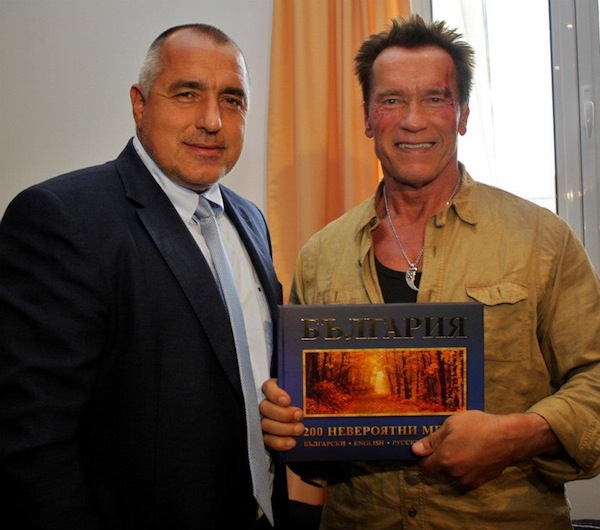
Movie stars Arnold Schwarzenegger, Sylvester Stallone, Chuck Norris, Bruce Willis and Jason Statham are actually in Bulgaria for the shooting of the "The Expendables 2" at the Nu Boyana Film Studios.
Bodyguard services are provided by a Bulgarian security firm connected to the most powerful local organized crime group TIM, according to secret cables sent from the US Embassy in Sofia and published by Wikileaks.
Pictures taken during Schwarzenegger's arrival at the Sofia International Airport, published in Bulgarian media, show a Mercedes SUV, waiting for the actor, with license plate C4401XA, registered to a company owned by the Varna-based TIM and commonly used by the TIM boss Ivo Kamenov. According to unconfirmed reports, the SUV is armored to the 7b level, which is very rare in Bulgaria.
Another picture portrays kick boxer Todor Todorov standing close to Schwarzenegger. Todorov is a competitor of the TIM sports club and a bodyguard, employed by the Sark Group company, founded in 2004 by the former chief of security of TIM boss Marin Mitev.
The security activities of TIM are spread among several firms with the most popular one being TIM EOOD, offering VIP security services in Bulgaria and abroad, according to the official internet page tim.bg.
The Nu Boyana studios, contacted by bivol.bg, have declined giving information about the company providing security for Hollywood stars, shooting in Sofia, and in particular for Schwarzenegger.
TIM - "The up-and-coming star of Bulgarian organized crime"
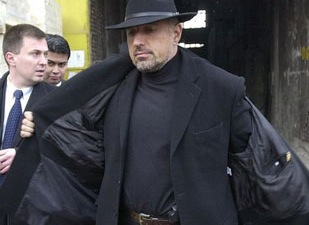
Bulgarian Prime Minister, Boyko Borisov, in an interview for the political TV show “Face to Face” with host, Tsvetanka Rizova, September 4, 2011. (Video here):
TR: There was information, released by WikiLeaks, showing your position on GMO had been quite hypocritical.
BB: Released by whom?
TR: Hmm, I don’t know if you are aware that your ministers went to…
BB: I do not read them.
TR: Well, let me tell you. Your ministers…
BB: I do not read them.
TR: Your ministers went there and have said that due to public pressure we will not plant GMO crops, but otherwise we want them and count on Europe to make us do it.
BB: I think that…
TR: What are our guarantees that you are sincere when it comes to the environment?
BB: (thinking) What minister went there?
TR: Miroslav Naydenov (Agriculture Minister) is cited there.
BB: I asked him; he said he did not go. And he did not discuss any such matter.
...
BB: And about GMO… The way you presented it, it looks like someone had been a hypocrite.
TR: Yes, this is how it looks like, according to WikiLeaks; it was simply hypocritical.
BB: Who is WikiLeaks?
TR: How come, who is WikiLeaks? (BB: Who does it represent; who decides…) The ones who release the cables…no one has denied these cables so far.
BB: Yes, because no one wants to deal with them, because once they start denying them…
TR: Don’t you think that if this was a lie, there would have been some official statement? Everyone keeps quiet; it means they are true.
BB: If they were true, they would have published them all, from A to Z, not selectively, to choose and release depending on when and what is convenient… in connection…I am talking about those on Bulgaria.
TR: We must come to conclusion now.
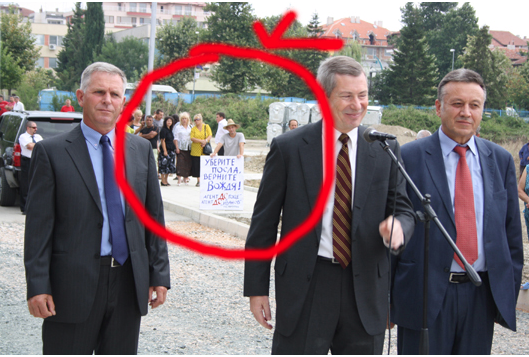
Your Excellency,
One year ago you were opening a bridge connecting the Roma district in Tsarevo with the rest of the Black Sea town.
You were standing among the audience next to the town’s Mayor, Petko Arnaudov, and Regional Governor, Konstantin Grebenarov. Both are former members of a party, declared criminal by current Bulgarian legislation – the Bulgarian Communist Party, and are agents of the macabre Communist State Security, DS.
I stood behind you with a large portrait of Lenin. The following message was written on its back: “Уберите посла, верните Вождя. Агент ДС “Гоце” и Агент ДС “Иванов” град Мичурин” (In Russian, meaning “Take away the Ambassador, bring back the Leader. DS Agent Gotse (which is the alias of current Bulgarian President, Georgi Parvanov, as Communist State Security Agent) and DS Agent, Ivanov (which is the alias of the Mayor Petko Arnaudov), town of Michurin).
I was hoping that you, personally, and the attending media would notice the board and ask me why I was standing there and what this curious installation meant. But the first one to notice me, even before you, was the Mayor, who became outraged and said: “Who is the Gipsy with Lenin?”
Police arrived and took me away to the precinct where I received a citation for violating public order, even though I did not violate anything. They also confiscated my sign. I suppose meanwhile Agent Ivanov (Petko Arnaudov) took you to an official dinner where you proposed toasts for the integration of Roma.
Minutes before the policemen took me away, I saw you hugging and kissing Agent Ivanov. It was truly touching. The Roma applauded, the municipal female workers were taking deep breaths and were moved.
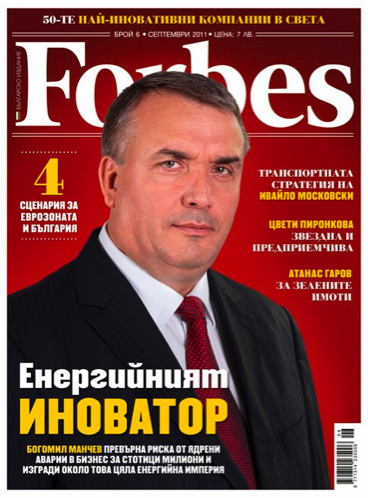
This week edition of Forbes - Bulgaria features Bogomil Manchev on the cover page. Manchev who's presented by Forbes as an "energy innovator" has been exposed in a secret diplomatic cable from Sofia, revealed by WikiLeaks. Bivol reminds the excerpts about Manchev from the cable named DIRTY ENERGY: CORRUPTION AND LACK OF TRANSPARENCY PLAGUE BULGARIAN ENERGY SECTOR [06SOFIA1691], sent 2006-12-20 by the chargé d'affaires in the US Embassy in Sofia - Alex Karagianis
BULGARIA'S ENERGY MAFIA: BOGOMIL MANCHEV ¶7. (C) Three names always mentioned as key players in Bulgaria's so-called "energy mafia" are Bogomil Manchev from Risk Engineering, Krassimir Georgiev from Frontier and Hristo Kovachki. Manchev and Georgiev have been omnipresent in the sector since the early 1990s, while Kovachki is considered a new player. ¶8. (C) Bogomil Manchev's presence in the energy field, particularly the nuclear sector, is pervasive. His engineering and consulting company, Risk Engineering, founded in 1992, got its start working as a subcontractor for Westinghouse for a EU Phare project related to Kozloduy's Units 1-4. From there, Manchev and Risk's influence grew as he won successive Phare projects for improving safety and security measures at Kozloduy Units 3 and 4, preparing documents for the development of Bulgaria's uranium mines in Simitli and Dospat, assessing a potential national storehouse for radioactive waste, etc. ¶9. (C) By the time of Prime Minister Simeon Saxe-Coburg Gotha's
On October 26, 2005, on the so-called “government route” on “Bulgaria” boulevard in Sofia, banker Emil Kuylev was gunned down. Immediately after the murder, the top people in the country – Interior Minister, Rumen Petkov, Chief Prosecutor, Nikola Filchev, and President Parvanov publically declared that Kyulev’s business was “clean.”
The American Ambassador in Sofia at the time, John Beyrle, however, has been of a different opinion since the same afternoon he sent to the State Department a report titled “TOP BULGARIAN MONEY LAUNDERER SHOT DEAD IN SOFIA” [05SOFIA1847]. He does not mention the name of the “top launderer,” but provides in the text a thorough biography and business portrait of Kuylev – a former policeman, who had used his connections in the services to create consulting businesses, and later a bank, in partnership with Michael Chorny, receiving a “sweetheart deal” from the State – the right to handle, through Roseximbank, all payments of the Bulgarian Tax Directorate and the Customs Agency, as well as the operations of the biggest tax-payers in the country; a founder of Vazrajdane Business Club along with Multigroup boss Iliya Pavlov (shot dead in 2003) and Vasil "The Skull" Bozhkov; a former advisor to President Georgi Parvanov and, (according to unconfirmed reports), a major political campaign sponsor of the National Movement for Stability and Prosperity (NDSV) party of former King and Prime Minister Simeon Saxe-Coburg, of the Bulgarian Socialist Party, BSP, and of Parvanov himself for his 2001 campaign – these are the traits of the image of one of the wealthiest people in Bulgaria.
Kyulev had applied significant effort to clean this image, even hiring an American lobbyist. Seemingly, the result had not been very convincing because, as the Ambassador points out, the Foundation for Fight against Human Trafficking, established by the banker, was suspected in money laundering.
Borissov described himself as "Bulgaria's biggest asset"
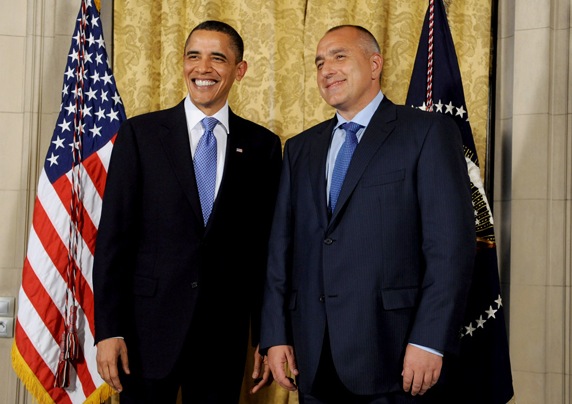
"We must continue to walk a fine line between being used by Borisov's publicity machine and alienating an exceptionally popular and seemingly pro-American politician who may emerge as Bulgaria's next leader. In other words, we should continue to push him in the right direction, but never forget who we're dealing with."
This is the conclusion of a diplomatic report dedicated to now Bulgarian Prime Minister, Boyko Borisov, sent by former US Ambassador to Sofia, Jonh Beyrle on May 9, 2006. The report’s confidentiality level is listed as SECRET/NOT FOR FOREIGNERS, only one level below the highest TOP SECRET – cables classified as TOP SECRET are not available to Wikileaks.
The reasons for classifying the report are coded as 1.5 (b,d), meaning confidential sources have been used in its preparation.
The cable has another characteristic – from a total of 978 reports sent from Sofia, there are just a few that have been checked and approved simultaneously by the Embassy’s political, military and security advisors, not just Ambassador Beyrle.
"The Dirt"
This is how Beyrle titled the section focusing on Boyko Borisov’s criminal past. Incidentally, the paragraph has the "lucky" number 13, while in the brackets, after 13, the level of confidentiality is purposely listed as SECRET/NOFOR, which corresponds to the highest level of classified information for this cable.

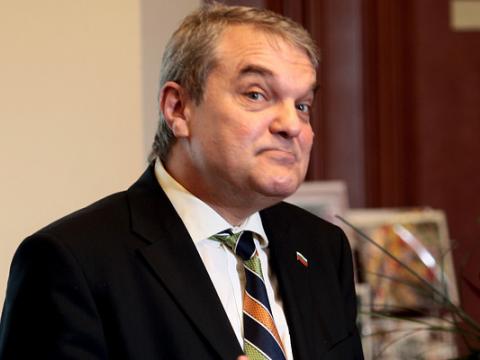
Former Interior Minister of Bulgaria (2005-2008), Rumen Petkov is presented as a "hard working, hard drinking", controversial figure, related to political corruption and russian intelligence in a WikiLeaks diplomatic cable released by the Wikileaks partner Bivol.bg also published on balkanleaks.eu
Before his appointment as a Minister, Petkov was the mayor of the central Bulgarian city of Pleven where he was "dogged by scandals, some serious and some -- like his late night arrest for urinating in a public fountain --simply illustrative of his unpolished style" - wrote the American ambassador in Sofia.
Rumen Petkov became one of the most influential personalities in the Bulgarian government under PM Stanishev (2005-2009).
His past associations with controversial figures may make it difficult for him to move against certain Organized Crime interests - the Ambassador John Bayrle reported. He also believes Petkov has "long been publicly associated with Russians who are either directly or indirectly affiliated with Russian intelligence,"
While Petkov was a Minister "The five largest organized crime groups in Bulgaria (TIM, VIS, SIC, Nove Holding, and Multigroup) ... generally operated with impunity," Bayrle stated.
Petkov resigned in April 2008 after a huge political scandal following the revelation that he met with The Galevi Brothers, alleged drug lords. Despite the strong evidence that Petkov protected alleged criminals and shady alcool business from justice, Petkov was never investigated by the prosecutor office.
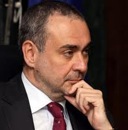
Bivol.bg (partial translation)
Bulgarian Chief Prosecutor, Boris Velchev, has painted an apocalyptic picture of the state of the prosecution services in the country at a meeting with American Ambassador, John Beyrle, held soon after Velchev’s election to the post. This has been revealed in a cable written by Beyrle, dated February 7, 2006, and leaked by Wikileaks [06SOFIA198].
The prosecutor’s office under the leadership of Velchev’s predecessor, Nikola Vilchev, was described by the new Chief Prosecutor as "some kind of terrorist organization" used to settle political and business scores, but totally incapable of fighting crime.
Empty files and hostile deputies, who did not even want to talk to him, is what Velchev stumbled upon at the prosecution services. He had described his priority of cleansing the institution from corrupt prosecutors as "some kind of a war".
Velchev’s “war,” however, has implications beyond the borders of Bulgaria – it must lead to effective guilty verdicts of organized crime bosses, one of the top requirements of the EU, monitoring Bulgaria before its accession to the Union.
Facing the outrageous failure of Bulgarian prosecutors and law enforcement to collect sound evidence against the leaders of organized crime, the Chief Prosecutor declares, according to Bayrle, his equally outrageous plan to seek “a contract with the Courts.” Ambassador Beyrle explains this means appealing to judges to sentence criminal bosses “based on evidence that otherwise might not pass muster“.
Two weeks after the publishing of the full, unedited version of a diplomatic cable exposing the total invasion of Bulgarian economics and politics by the organized crime, the topic seems to be closed for Bulgarian media.
Bulgaria is known to have one of the most censored media in the European Union. In the last press freedom index of Reporters without Borders, the country shares the 70th ranking with Benin, Kenya and Greece.
One of the reasons for such low freedom of speech standards is shady media ownership. As the US ambassador reports in the cable, figures connected to organized crime own, directly or indirectly, the country’s mainstream printed and electronic media. This results in censorship and self-censorship on topics about the ties between the Mafia and the politics.
The media reaction, after the cable on organized crime was published, went through the classic way of dealing with such scandalous information: 1. Ignore it 2. Ridicule it 3. Fight it... then return to number 1.
1. Ignore it: The initial publication of the unedited cable on the Bivol independent investigative journalism web site was only reprinted in few independent blogs and web sites, most of them edited from abroad: (Ivo Indzhev, Eurochicago, Kafene). Only one big Bulgarian newspaper printed a link to the publication in a short article. The content of the cable, however, was greatly commented on and cited in online forums.
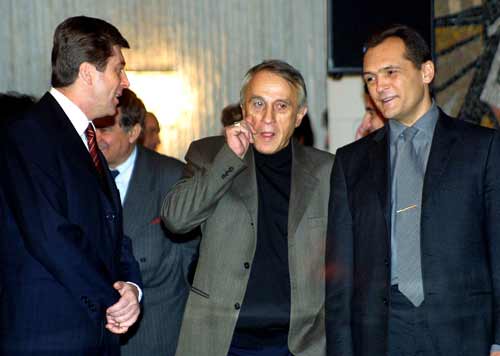
In June 2003, the Bulgarian weekly Kapital published an article about the privatization of "Atomenergoremont" - the Bulgarian State-owned company, (the only one), maintaining the Kozloduy Nuclear Power Plant. Under the suggestive title "Criminal Radiation," it exposed the main competing candidates: Vasil Bozhkov Aka "The Scull" and Konstantin Dimitrov AKA "Samokovetza,” both known as controversial figures, suspected of criminal activities.
Just a few months later, Konstantin Dimitrov Samokovetza was shot dead in Amsterdam by a contract killer. As for Atomenergoremont, it was sold to the "Bulgarian Energy Company" owned by Hristo Kovachki, the next controversial businessman, who is currently on bail over accusations of tax evasion.
However, the Wikileaks unedited cable recently revealed that James Pardew, the American ambassador to Sofia at the time, wrote in 2005 that Vasil Bozhkov "is believed to control “Risk Engineering,” another key firm in the Bulgarian nuclear business. On the other hand, Ambassador Pardew also reported that Bozhkov is considered to be the ringleader of an organized crime group. "Bozhkov's illegal activities include money laundering, privatization fraud, intimidation, extortion and racketeering," the cable notes.
Analysis of unedited cable: 2011-03-18 Bulgarian Organized Crime Uncensored
2011-03-19 Bulgarian "Criminal Radiation" Leaks from Unedited Wikileaks Cable
Bulgarian translation of both articles here.
UPDATE: The Wikileaks site has now been updated with the uncensored version of the 05SOFIA1207 cable. The full text scores 5226 words compared to the 1406 words in the Guardian redacted version published on December 1 2010. The redactions are shown clearly here (thanks to commenter rhill for pointing it out). The parts that were redacted are green.
At the end of November, 2010, Wikileaks triggered the Cablegate scandal: the release of 251 287 secret American diplomatic cables. Currently, the site has published 5 000 cables or about 2% of the entire database. Eight of them are from the American Embassy in Sofia.
The Wikileaks site has a total of 978 diplomatic cables from the US Embassy in Sofia. There are another 66 cables with the tag Bulgaria.
On December 1, 2010, The Guardian published on its site the diplomatic cable of the American Embassy in Sofia dedicated to organized crime in Bulgaria.
On December 7, 2010, Le Monde published an overview about the influence of Russian mafia in Europe, also citing the cable, signed by then Ambassador to Sofia, James Pardew.
Under the light of the killing of members of the WikiLeaks staff and the death threats Julian Assange has received in the last months, taken seriously by the British authorities, the website Committee to Protect Journalists dot Org published today (01-04-2011) an interactive tool that shows the 44 Journalists Killed in 2010 after Confirmed Motive. Below, extracts from a short article in The Wall Street Journal on the topic:
The Committee to Protect Journalists, or CPJ, which defends media workers around the world, tracks and investigates the circumstances surrounding the deaths of journalists, and it created an interactive infographic showing where, how and why most were killed last year. Thirteen of the 44, or 30%, were corruption beat reporters. Other top beats of journalists killed included politics, war, culture and crime. Some of the beats overlapped, however, causing the aggregated percentages to go far over 100%.
Theme by Danetsoft and Danang Probo Sayekti inspired by Maksimer